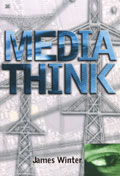

|
|

Media Think
Winter, James
Publisher: Black Rose Books, Montreal, CanadaYear Published: 2000 Pages: 183pp Price: $19.99 ISBN: 1-55164-054-6 Library of Congress Number: P91.W56 2000 Dewey: 302.23 Resource Type: Book Cx Number: CX7034 Increasingly the news media are owned by a small group of very large corporations with extensive interests outside the industry, run by the corporate elite.Winter argues that instead of offering diverse perspectives on events and issues, the media portray an increasingly dogmatic and orthodox corporate picture of the world around us. The consistency with which they do this has its consequent, intended effect on public opinion and policy formation. Abstract: Winter shows how mainstream media negatively influence public opinion and policy formation through the production of an increasingly "dogmatic" and "orthodox corporate" world view. The book explains this ideology by using international and Canadian events. For example, in the Preface Winter analyses the coverage of the September 11th terrorist attacks and aftermath according to the paradigms of MediaThink. He argues convincingly that the media should scrutinise governmental policies, hold governments accountable for waging war and "defend public interest" by representing diverse views regarding the event in question. MediaThink, a term coined by the author that is similar to Orwell's "orthodoxy" (introduced in Orwell's introduction to Animal Farm discussing censorship of British journalism) or Gramsci's "common sense," is the "media owners', managers' and workers' way of thinking, of seeing and representing events in the world around us." The media makes unofficial decisions to censor certain facts because they do not fit in the "assumed body of ideas". This orthodoxy is not always monolithic in nature as alternative perspectives often exist, yet are overwhelmed by the dominant view. Media Think is the second book in a trilogy which began with Common Cents, written in 1992. In this book Winter discusses the answers to the following questions about the media: How is it that they go about lying to us? Why do they do so? And what is it that they tell us and don't tell us? Within each of the five chapters Winter shows how the media inaccurately portrays events with a special focus on the following case studies: East Timor independence, the portrayal of women, the war in Kosovo and self-determination for ethnic Albanians, feminism on the Supreme Court, and people of colour. [Abstract by Amanpreet Dhami] Table of Contents Preface Acknowledgments Introduction: Some Lies to Expose To Win Their Hearts and Minds Feminism Did It The Nuclear Desert Nellie Mc Clung Rolls Over Just Desserts Appendix A Index Subject Headings
|